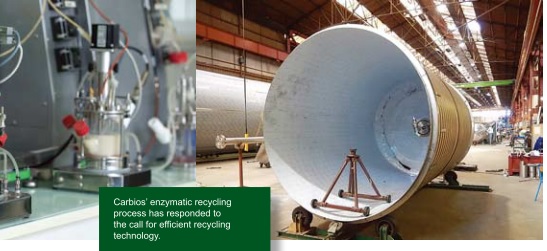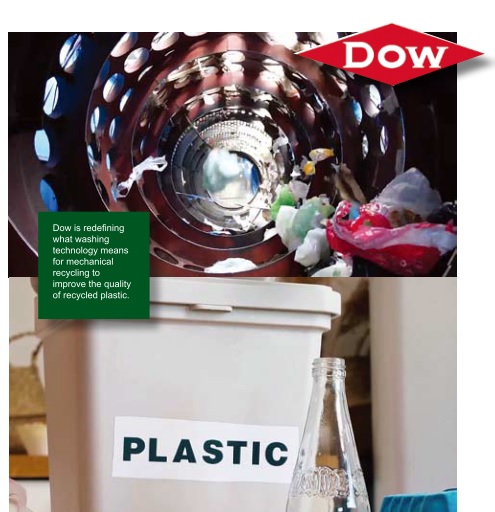According to the World Economic Forum, if current trends continue, by 2050, there could be more plastic in the oceans than fish.
Recent trends point towards improvement in the recycling process in response to the challenges of environment protection.
Carbios: Enzymes technology for efficient recycling
Carbios has made significant strides in the field of sustainable materials and for securing a growing portfolio of patents for its proprietary technologies.
At the heart of Carbios’ work is a commitment to sustainability and the circular economy. The traditional linear model of production and consumption is no longer viable, and the planet’s future depends on finding new, sustainable solutions. By harnessing the power of enzymes to break down waste plastics and other materials into their constituent parts, Carbios is helping to create a circular system where waste is transformed into new, high-quality materials.

The company’s work has earned recognition from the Ellen MacArthur Foundation’s Circular Economy Network, a global network of organisations dedicated to creating a more sustainable future. Carbios has access to valuable resources and expertise as a member of this network, allowing it to collaborate with other like-minded organisations to create a more sustainable future for all.
Carbios is doing that with its enzymatic technologies. Traditional recycling methods rely on mechanical or thermal processes to break down materials, which can be energy-intensive and produce lower-quality materials. Enzymatic processes, on the other hand, use enzymes to break down materials into their constituent parts, which can then be used to create new products. This approach is more efficient and sustainable, reducing the amount of waste that ends up in landfills and oceans.
Carbios’ proprietary enzymatic technologies have been developed over several years of research and development. The company’s scientists have identified and optimised enzymes that can efficiently break down a variety of materials, including PET plastic, one of the most widely used plastics in the world. This work has resulted in a growing portfolio of patents, including several granted in the past two years.
One of the most significant benefits of Carbios’ enzymatic technologies is their ability to address the issue of plastic pollution. Every year, millions of tonnes of plastic end up in the world’s oceans, where they can take hundreds of years to decompose. By transforming waste plastics into new, high-quality materials, Carbios is helping to keep plastic out of the environment and reduce the need for new plastic production, a major contributor to greenhouse gas emissions. Another important aspect of Carbios’ work is its commitment to collaboration. The company recognises that no single organisation can solve the complex challenges facing our planet and is committed to working with partners across industries to create a more sustainable future. Carbios hopes to accelerate the transition to a circular economy and create a more sustainable future by sharing knowledge, expertise, and resources.
In 2022, Carbios signed a letter of intent with L’Oréal, Nestlé Waters, PepsiCo, and Suntory Beverage & Food Europe to establish a consortium to bring Carbios’ enzymatic recycling technology to market. This partnership is a significant step forward in the development of sustainable materials, bringing together major players in the industry to create a more sustainable future.
Carbios’ work is not limited to recycling plastics. The company is also developing enzymatic technologies for recycling textiles and other materials, further expanding the scope of its impact.
Dow: Washing technology for high-quality mechanical recycling
Dow has introduced EVOWASH™, an innovative washing technology that supports high-quality mechanical recycling for exceptional post- consumer-recycled (PCR) plastic resins that meet customer expectations. The solution minimises commercial risk and investment in resources to develop a robust mechanical recycling infrastructure. It challenges the status quo in mechanical recycling washing technology, enabling the plastics industry to transition to a circular economy.

The technology works in four dimensions, starting with surface cleaning. EVOWASH™ removes up to twice as much adhesive compared to other technologies, improving the physical appearance of recycled plastics in terms of colours, neutral tones, and luminosity. Foam management is also enhanced, with up to three times less dosage, which reduces product usage and cost efficiency. Lastly, odour control is improved, reducing undesired odours in recycled plastic.
Dow’s EVOWASH™ includes two fully formulated, ready-to-use process aids that enable the reduction of surface contaminants, such as adhesives, up to 2X higher than the industry standard. This results in higher purity in the final resin while optimising foam dosage and costs. The solution challenges the status quo in mechanical recycling washing technology, improving the quality of recycled plastic for various industries.
To enable the transition to a circular economy, the waste value chain requires increasing quality and consistency in recycled products. EVOWASH™ mechanical recycling auxiliaries include an industry-leading range of proven detergents and antifoam agents designed to deliver exceptional PCR resins. This raises the bar for recycled products to meet the strongest quality standards.
EVOWASH™ detergents and antifoams are designed to deliver recycled plastic with the highest quality while maximising the reuse of process water. Dow’s products have performed successfully in recycling systems with discharge cycles above seven days without impacting compliance with local regulations for process effluents. This feature is crucial in reducing the environmental impact of the recycling process.
Through collaborative innovation across the globe, a growing family of EVOWASH™ detergents and antifoams is being developed to address the diverse challenges in plastics recycling. From food grade to industrial grade and Low- Density Polyethylene (LDPE) and High- Density Polyethylene (HDPE) to PET and Polypropylene (PP), Dow’s technology is helping to evolve the industry.
In this line, EVOWASH™ includes two fully formulated, ready-to-use process aids: EVOWASH™ detergents and EVOWASH™ defoamers. The solution reduces surface contaminants such as adhesives by up to 95%, providing higher purity in the final resins. It also optimises foam dosage, water circularity, and costs. Dow’s EVOWASH™ is an innovative washing technology that advances the quality of recycled plastic, enabling the plastics industry to transition to a circular economy. With EVOWASH™, Dow is redefining what high-quality washing means for plastics recycling and contributing to the evolution and transformation of the plastics industry.
- This article also appears in the International Plastics News for Asia - April issue. Click here to read the full issue.














